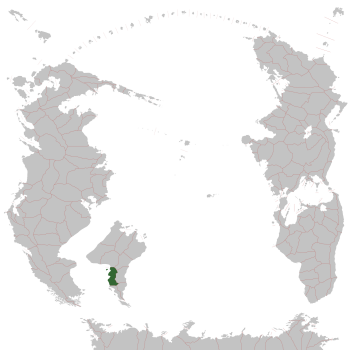Esfalsa (Pacifica)
Esfalsa | |
|---|---|
Motto: Portus pro omnibus A haven for all | |
 | |
| Capital and largest city | Ricubai |
| Official languages | Austral |
| Ethnic groups (2020) |
|
| Religion (2020) |
|
| Demonym(s) | Esfalsan |
| Government | Unitary presidential directorial republic |
• Chancellor | Levi Herdes |
| Legislature | Esfalsan Assembly |
| Senate | |
| Diet | |
| Formation | |
• Confederation | 1043 |
• Republic established | 1858 |
• Current constitution | 1924 |
| Area | |
• Total land area | 65,987 km2 (25,478 sq mi) |
| Population | |
• 2020 estimate | 18,793,005 |
• 2015 census | 18,679,062 |
• Density | 284.80/km2 (737.6/sq mi) |
| GDP (PPP) | 2020 estimate |
• Total | $1.18 trillion |
• Per capita | $62,617 |
| Gini (2019) | 27.4 low |
| HDI (2019) | 0.932 very high |
| Currency | Esfalsan dollar (EFD) |
| Time zone | UTC-1 (CET) |
| Date format | mm/dd/yyyy CE |
| Driving side | right |
| Calling code | +33 |
| Internet TLD | .esf, .ef |
Esfalsa is a sovereign state located on the continent of Crabry in the South Pacific. Its western coast faces the Transcrabrian Sea, and it shares land borders with Yishevyu, Phanama, Hintonia, and Valencia, along with a maritime border with Techganet. Its capital is located in Ricubai, facing Portum Bay. The geography of Esfalsa is characterized by flat, arable land, although the temperate climate also lends itself to many forests.
The earliest signs of civilization in Esfalsa can be traced back to around 2200 BCE. However, historians generally agree that an Esfalsa ethnic identity did not emerge until around the 5th century BCE. Esfalsa itself was initially formed as a confederation of seven different kingdoms in 1043, although due to shared ethnic and cultural ties, and a ever-more-complex network of marital ties, the kingdoms had already shared a strong multilateral relationship for many years prior. The present Constitution of Esfalsa was adopted in 1858, establishing a single, unitary republic, which remains in place today despite significant amendments and revisions. Among the most notable of these amendments is the Second Italedo Amendment of 1924, which installed a number of sweeping changes, including the establishment of the Chancellor of Esfalsa as the head of government.
Esfalsa is a well-developed country, with a high standard of living. The advanced Esfalsan economy provides a high per capita income, and is led by the information technology sector, although the agricultural sector also represent a signficant portion of the economy. Esfalsa also ranks highly among nations in Pacifica in terms of human development, education, and income equality, partly as a result of extensive government programs in education, health care, and other social services.